Needs and expectations of Swiss OGD Community
- Community
- Public Sector

Free access to government data promotes transparency and participation, strengthens accountability and helps to increase value creation. In addition, Open Government Data (OGD) is an integral part of implementing the UN 2030 Agenda for Sustainable Development. With the Open Government Data (OGD) Strategy 2019–2023, the federal government promotes the offer and use of its machine-readable, open and reusable government data.
As a basis for the follow-up to the Open Government Data Strategy 2019-2023 (from 2024) and against the background of the entry into force of the Federal Act on the Use of Electronic Means for the Fulfillment of Government Tasks (EMBAG), the OGD Office and Opendata.ch conducted a survey among publishers and users of OGD to find out their needs and expectations.
The most important results:
- Required government data is only partially available as OGD. Respondents particularly call for more data on politics/political transparency, population and society, health, companies and mobility. Specifically, land registry data, the Federal Buildings and Housing Register (GWR) and parliamentary data are mentioned most often.
- Lack of culture, management/governance, competence, and common standards hinder OGD publication. Initiatives/strategies, external influences, and the principle of “open by default” support their publication. In addition, for respondents external to the administration, the citizens’ right to access data funded by their taxes and the perceived benefits to society and/or the economy are particularly relevant. Training, legal and policy measures, and tools and guidelines for data creation, use, dissemination, and sharing could strengthen the publication of OGD in the view of respondents.
- For 7 out of 10 administrators, “open by default” is not currently incorporated as a principle in their organization’s data governance or they do not know about it.
- Open administrative data that has been used in the last 12 months is, in the view of the respondents, often easy to find, up-to-date, and has a contact person or point indicated.
- From the respondents’ perspective, OGD is rarely interoperable, rarely available in one click and as a bulk query, and rarely available as Linked Open Data.
- In particular, OGD guidelines are not or only partially met for data on population and society, health, land use & ownership, and businesses, in the view of respondents.
- More than half of the respondents used the central portal for open data opendata.swiss at least once in the last 12 months, and almost 60% of the respondents from outside the administration. The main reasons cited by users are that it is the national portal for OGD, that they are familiar with it, and that they assume they will find the data they are looking for there.
- Respondents would like opendata.swiss to improve the search and preview function, the description of the data/metadata, and a more demand-oriented offer of data sets.
- In order to promote the use of OGD, the respondents mainly suggest tools and guidelines for the creation, use, dissemination and exchange of data. In addition, (external) communication, training, and legal and policy measures are called for. The proposed measures show that promoting the publication and use of OGD are two sides of the same coin and need to be thought of together.
- The respondents estimate the extent of exchange and networking between users and providers of OGD as currently too low to the right degree.
- The respondents would like to see above all training and further education, workshops, information events and informal network meetings for the exchange between users and providers of OGD.
- The respondents rate the existing opportunities to provide the administration with feedback on currently available data sets in the “midfield”. Respondents from outside the administration rate these possibilities as less given than administration employees. As a feedback channel, respondents would primarily like to see e-mail and direct forms to the publishing office. A comment function is also considered useful.
- The respondents rate the existing possibilities of suggesting data records to the administration for publication in the “midfield” to rather too little given. Those outside the administration rate this possibility as less given than administration employees.
Based on the results presented here, there is potential for improvement with regard to the offer and use of OGD: The subject areas such as mobility, health, population and society, and corporate data are explicitly characterized as priorities in the OGD Strategy 2019-2023 and/or in the context of the High Value Datasets of the European Union. They have a particularly large societal and economic benefit. At the same time, the “open by default” principle under the current OGD strategy has stated since 2020 that data not worthy of protection must in principle be published as OGD. This principle will (presumably) be enshrined at the legislative level from 2023 with the EMBAG.
The results suggest that the legal measures must be accompanied by an even more far-reaching (data) cultural change, a strengthening of data governance at the national level, data management at the level of the administrative units and an expansion of data competencies (data literacy). Training and further education, tools/guidelines, communication measures and, last but not least, regular exchange between users and publishers can support the broad implementation of “open by default”, accelerate the digital transformation of the federal administration, achieve a (data) cultural change and use data in a way that adds value in the interests of civil society, the economy and science.
